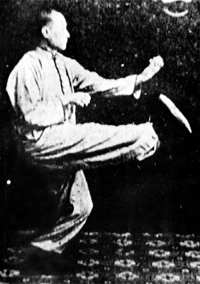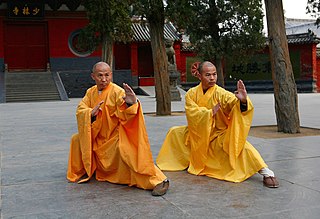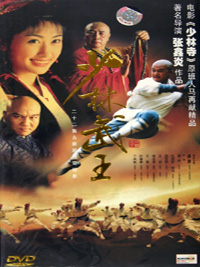
Shaolin kung fu, also called Shaolin Wushu, or Shaolin quan, is one of the oldest, largest, and most famous styles of wushu, or kung fu of Chan Buddhism. It combines Chan philosophy and martial arts and was developed in the Shaolin Temple in Henan province, Greater China during its 1500-year history. Popular sayings in Chinese folklore related to this practice include "All martial arts under heaven originated from Shaolin" and "Shaolin kung fu is the best under heaven," indicating the influence of Shaolin kung fu among martial arts. The name Shaolin is also used as a brand for the so-called external styles of kung fu. Many styles in southern and northern China use the name Shaolin.

Eagle Claw is a style of Chinese martial arts known for its gripping techniques, system of joint locks, takedowns, and pressure point strikes, which is representative of Chinese grappling known as Chin Na. The style is normally attributed to the famous patriotic Song dynasty General Yue Fei. Popular legends states that he learned martial arts from a Shaolin Monk named Zhou Tong and later created Eagle Claw to help his armies combat the invading armies of the Jin dynasty. It was passed down until the Ming dynasty. Thus, the style took on long range strikes and aerial jumps. During the Qing dynasty, the military instructor Liu Shi Jun became known as the modern progenitor of Eagle Claw and taught many students. His student Liu Cheng You later taught Chen Zizheng who was invited to teach the style in the prestigious Chin Woo Athletic Association during the Republican era. The style spread as Chin Woo opened sister schools in other provinces. Today, it is practiced around the world.

Ten Tigers of Canton or Ten Tigers of Guangdong refers to a group of ten Chinese martial artists from Guangdong Province lived around the 19th century during the Qing dynasty in China. They were said to be the greatest fighters in Guangdong during the Qing era. Much of their existence has been embellished by folk legends and stories passed down from generation to generation.

Qi Jiguang, courtesy name Yuanjing, art names Nantang and Mengzhu, posthumous name Wuyi, was a Chinese military general and writer of the Ming dynasty. He is best known for leading the defense on the coastal regions against wokou pirate activities in the 16th century, as well as for the reinforcement of the Great Wall of China. Qi is also known for writing the military manuals Jixiao Xinshu and Lianbing Shiji or Record of Military Training (練兵實紀), which he based on his experience as a martial educator and defensive planner in the Ming military forces. He is regarded as a hero in Chinese culture.

In its broadest sense, Northern Shaolin is the external martial arts of Northern China, referring to those styles from the Northern Shaolin Monastery in Henan and specifically to the style practice by Gù Rǔzhāng, the Sōngshān Shí Lù Shàolínquán (嵩山十路少林拳) / Song Mountain Ten Road Shaolin Boxing.

The Shaolin Temple (少林寺) is a 1982 Chinese–Hong Kong martial arts film directed by Chang Hsin Yen and starring Jet Li in his debut role along with Ding Lan and Yu Hai in supporting roles. The film is based on the Shaolin Monastery in China and depicts Shaolin Kung Fu. The film was among the first major co-productions between Hong Kong and mainland China, and the first to be filmed in mainland China with a mostly mainland cast. The film's plot has an episodic storytelling structure while combining action, comedy and romance elements.

Romance of the Three Kingdoms is a Chinese television series adapted from the classical 14th century novel of the same title by Luo Guanzhong. The series was produced by China Central Television (CCTV) and was first aired on the network in 1994. It spanned a total of 84 episodes, each approximately 45 minutes long. One of the most expensive television series produced at the time, the project was completed over four years and involved over 400,000 cast and crew members, including divisions of the People's Liberation Army from the Beijing, Nanjing and Chengdu military regions. Some of the dialogues spoken by characters were adapted directly from the novel. Extensive battle scenes, such as the battles of Guandu, Red Cliffs and Xiaoting, were also live-acted.

Abbot of Shaolin (少林英雄榜) aka Shaolin Abbot aka Slice of Death is a Shaw Brothers film directed by Ho Meng Hua. It is a Shaolin Temple-themed martial arts film about their rebellion against the Qing, featuring David Chiang and Lo Lieh as Priest Pai Mei.

The Heaven Sword and Dragon Saber is a Chinese television series adapted from Louis Cha's novel of the same title. It is a final instalment of a television trilogy produced by Zhang Jizhong, preceded by The Legend of the Condor Heroes (2003) and The Return of the Condor Heroes (2006). Unlike the previous adaptations, this remake is the first to be primarily based on the third edition of the novel. The series was first broadcast on Wenzhou TV in China in October 2009.

All Men Are Brothers is a 2011 Chinese television series adapted from Shi Nai'an's 14th century novel Water Margin, one of the Four Great Classical Novels of Chinese literature. The series is directed by Kuk Kwok-leung and features cast members from mainland China, Taiwan and Hong Kong. The series was first broadcast on 8TV in March 2011 in Malaysia.

Shaolin King of Martial Arts is a 2002 Chinese wuxia television series directed by Chang Hsin-yen, Liu Jiacheng and Wu Chia-tai. It starred Wu Jing, Yaqi, Chunyu Shanshan, Gao Haiyan, Huang Yi, Yu Chenghui, Ji Chunhua, Yu Hai and Xu Xiangdong in the leading roles.
The Southern Shaolin Monastery or Nan-Shaolin (南少林) is the name of a Buddhist monastery whose existence and location are both disputed although associated ruins have been identified. By tradition, it is considered a source of Nanquan.

Justice Bao is a Chinese TV series starring producer Jin Chao-chun as the Song dynasty official Bao Zheng. The series ran for 3 seasons from 2010 to 2012. In addition to Jin, Kenny Ho, Fan Hung-hsuan and Lung Lung again reprise their iconic roles from the 1993 Taiwanese hit Justice Pao and the 2008 Chinese series Justice Bao.

Swordsman is a 2013 Chinese television series adapted from Louis Cha's novel The Smiling, Proud Wanderer. The series is written and produced by Yu Zheng, and stars Wallace Huo, Joe Chen, Yuan Shanshan, Chen Xiao and Yang Rong. Shooting started on 24 March 2015 in Xiandu, Jinyun County, Lishui, Zhejiang. It was first aired in China on Hunan Television from 6 February to 4 March 2013. The plot deviates significantly from the novel, with Dongfang Bubai depicted as a woman and having a romantic affair with Linghu Chong.
The Legend of Crazy Monk is a Chinese television series about the life of Ji Gong. The series was directed by Lin Tianyi and based on Guo Xiaoting's classical novel Biography of Ji Gong. It was a hot TV series recently in Guangdong Television, Jiangsu Television and Shenzhen Television. It is shown on Mediacorp Channel 8 at 7pm.

Singing All Along is a 2016 Chinese television series produced by Ruby Lin, starring Lin and Yuan Hong. Set in 1st-century imperial China, the drama is based on Li Xin's (李歆) 2007–2009 romantic novel series Xiuli Jiangshan (秀丽江山) and focuses on the relationship between Liu Xiu, a peasant-turned-Eastern Han dynasty founder, and Yin Lihua, the love of his life. Although the original novel involved time travel, the television series does not contain those parts.

Mingzhou or Ming Prefecture (738–1194) was a zhou (prefecture) in imperial China located in modern northeastern Zhejiang, China, around modern Ningbo. The prefecture was called Yuyao Commandery from 742 to 758.

Old Boy is a 2018 Chinese television series starring Liu Ye and Ariel Lin alongside Lei Jiayin and Hu Xianxu. It aired on Hunan TV from March 4 to April 19, 2018.

Love Scenery is a 2021 Chinese television series directed by Qin Zhen, adapted from the novel "A bright spear is easy to hide, but a secret love is hard to prevent" (明枪易躲,暗恋难防) by Qiao Yao. It starred Lin Yi and Xu Lu in the leading roles.















